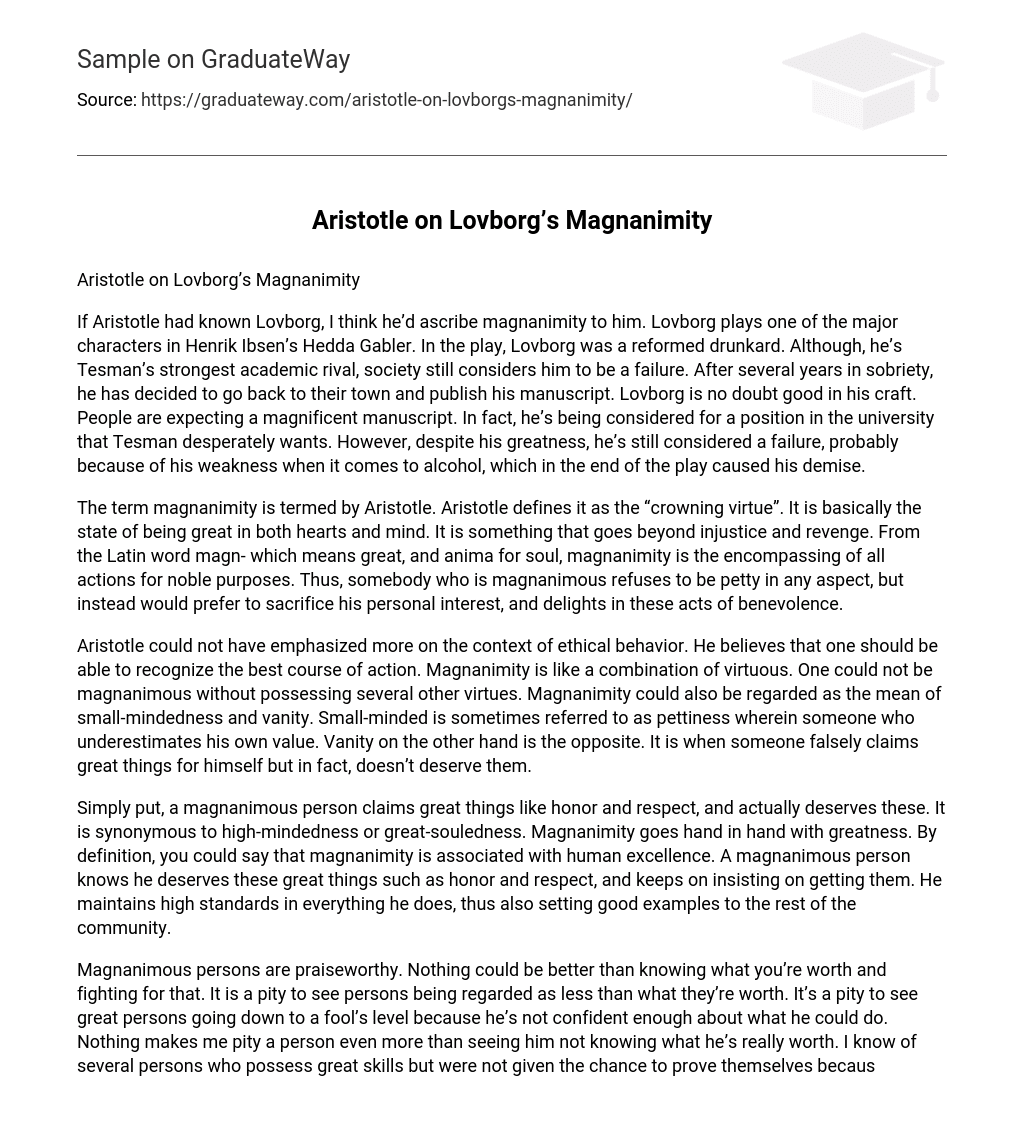If Aristotle had known Lovborg, I think he’d ascribe magnanimity to him. Lovborg plays one of the major characters in Henrik Ibsen’s Hedda Gabler. In the play, Lovborg was a reformed drunkard. Although, he’s Tesman’s strongest academic rival, society still considers him to be a failure. After several years in sobriety, he has decided to go back to their town and publish his manuscript. Lovborg is no doubt good in his craft. People are expecting a magnificent manuscript. In fact, he’s being considered for a position in the university that Tesman desperately wants. However, despite his greatness, he’s still considered a failure, probably because of his weakness when it comes to alcohol, which in the end of the play caused his demise.
The term magnanimity is termed by Aristotle. Aristotle defines it as the “crowning virtue”. It is basically the state of being great in both hearts and mind. It is something that goes beyond injustice and revenge. From the Latin word magn- which means great, and anima for soul, magnanimity is the encompassing of all actions for noble purposes. Thus, somebody who is magnanimous refuses to be petty in any aspect, but instead would prefer to sacrifice his personal interest, and delights in these acts of benevolence.
Aristotle could not have emphasized more on the context of ethical behavior. He believes that one should be able to recognize the best course of action. Magnanimity is like a combination of virtuous. One could not be magnanimous without possessing several other virtues. Magnanimity could also be regarded as the mean of small-mindedness and vanity. Small-minded is sometimes referred to as pettiness wherein someone who underestimates his own value. Vanity on the other hand is the opposite. It is when someone falsely claims great things for himself but in fact, doesn’t deserve them.
Simply put, a magnanimous person claims great things like honor and respect, and actually deserves these. It is synonymous to high-mindedness or great-souledness. Magnanimity goes hand in hand with greatness. By definition, you could say that magnanimity is associated with human excellence. A magnanimous person knows he deserves these great things such as honor and respect, and keeps on insisting on getting them. He maintains high standards in everything he does, thus also setting good examples to the rest of the community.
Magnanimous persons are praiseworthy. Nothing could be better than knowing what you’re worth and fighting for that. It is a pity to see persons being regarded as less than what they’re worth. It’s a pity to see great persons going down to a fool’s level because he’s not confident enough about what he could do. Nothing makes me pity a person even more than seeing him not knowing what he’s really worth. I know of several persons who possess great skills but were not given the chance to prove themselves because they’re not that strong to insist on something which they really deserve. Thus, if we see or hear of agents going at great lengths to get what they deserve, then we should raise our thumbs up to them. The world tends to be condescending that even getting something the you deserve is not anymore that easy to do.
In Henrik Ibsen’s play Hedda Gabber, however, the opposite happens. Lovborg gives himself very high regard, thus not fitting the definition of magnanimity. I don’t believe Lovborg shows the prerequisites of magnanimity. He’s good, yes, but he does not promote excellence in every aspect, which a magnanimous person should. The dialog between Tesman and Lovborg discussing Lovborg’s upcoming book release may show Lovborg as imposing greatness on himself, but I think that’s too much. It’s much more than what he probably deserves.
A magnanimous person is said to take pride on setting good examples and doing benevolent deeds. In the dialog, the only thing very apparent is Lovborg’s pride. Lovborg knows that he’s good but it seems that he has overestimated himself. This is a good example of what Aristotle might claim as vanity. Persons who don’t deserve that much praise and honor insist on getting them are simply vain. They aspire great things for themselves but they don’t really deserve those.
But the question is: should we praise Lovborg for sounding so vain towards Tesman during their conversation? I believe we do. Vanity is better than pettiness. He may not be everything what he claims to be, but at least he knows how to take pride in his work. Small-minded people puts themselves low before other people, and nothing is worse than that. Vanity on the other hand will just correct itself through time. Vain persons may first claim great thing they don’t really deserve, but through time, they’d be able to live up to their own expectations. There are only two possible outcomes for vanity: the person would realize he’s not that great, or he’d be able to work his way to meet his high expectations for himself.
Lovborg deserves our praises. People see him as a failure and a drunkard, but despite that, he insists on how good he is with what he does. He’s got strong spirits and regards himself high – too highly maybe. However, that’s a very good thing. It’s good to show people that you believe that you could do great things – much greater things than what these people think you could do. Insisting and showing people that you are great, when they believe otherwise, requires much strength, and for that Lovborg deserves our praises. It’s not easy to be proud when people has already seen you in your lowest state. It takes a lot of courage to simply stand up to them and show them that despite what has happened, you still believe you are great and deserves to be acknowledged.





